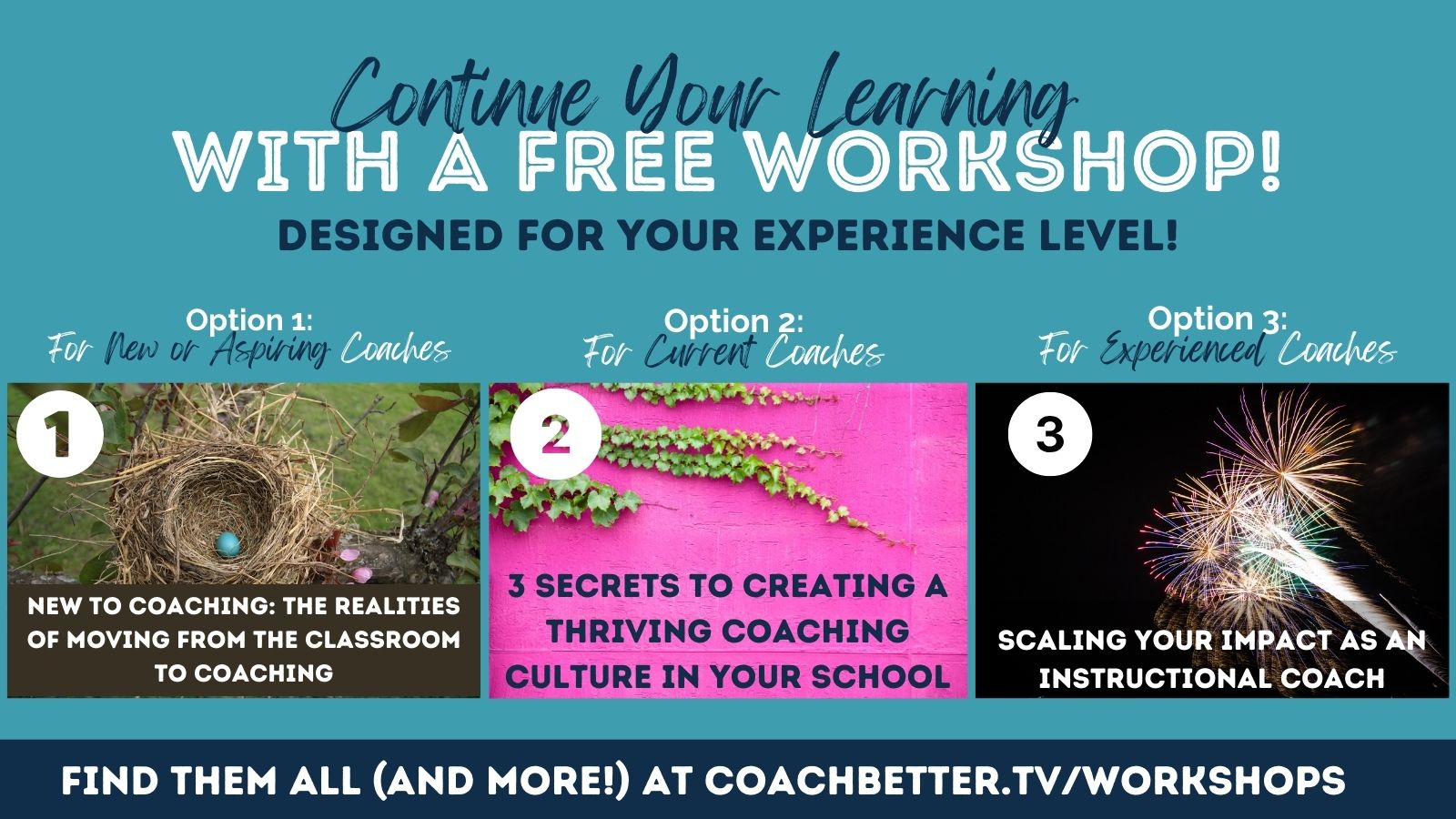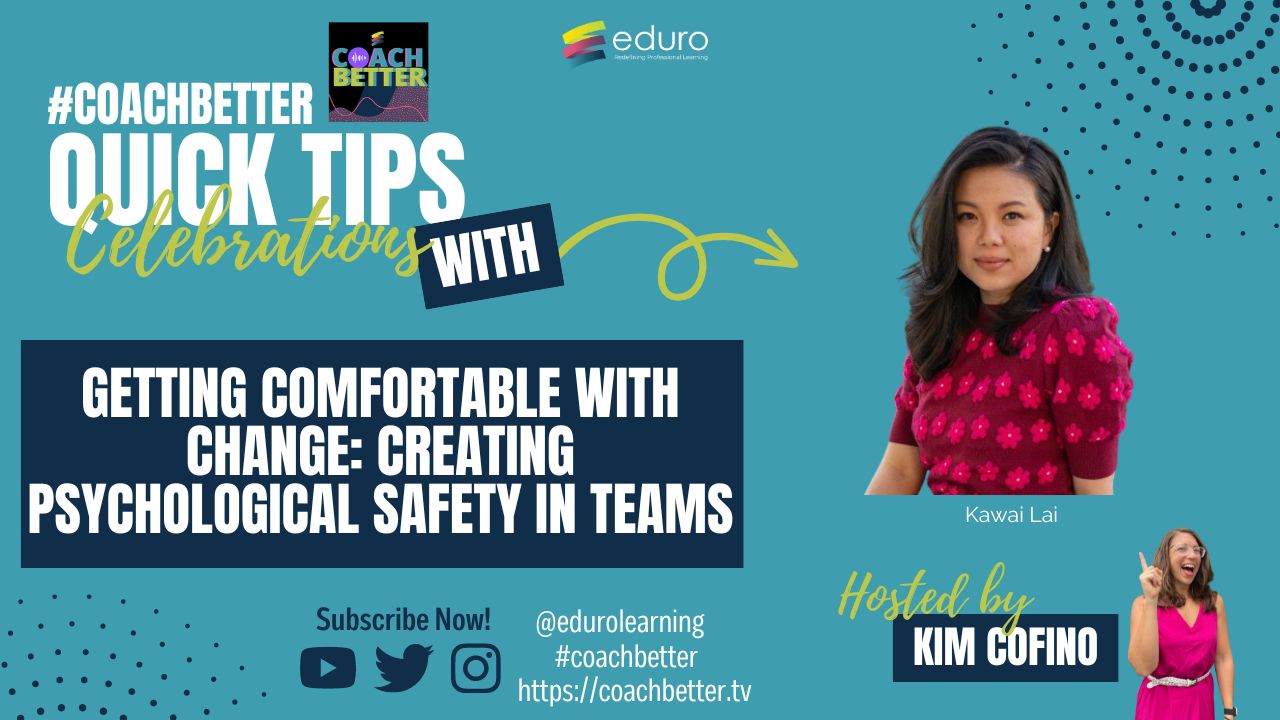This is a highlight from one of our previous podcast episodes featuring Kawai Lai. Kawai’s work focuses on helping teams and leaders rethink culture, strategy, and leadership using the power of visuals. This particular clip focuses on creating psychological safety in teams.
I’m sharing this one today because we know that trust and safety are two huge components of building coaching relationships, and we’ve been talking about the ways that instructional coaches are informal leaders in their schools all semester. This one clip gives concrete strategies on how you can create psychological safety with the teams that you work with right now. As a coach, and a leader, building this skill set will be essential in developing your relational leadership.
If you’re recognizing that you have an opportunity to grow – either into a coaching role, within your current role, or beyond, make sure to check out our workshops (and courses) for instructional coaches. We have options for coaches at every stage of their professional journey, so there’s definitely one that’s just right for you right now. Check them out at coachbetter.tv/workshops
What is Psychological Safety?
The concept of psychological safety, a term coined by Amy Edmondson, Harvard Business School means: a work environment where one can speak up with their questions, ideas, concerns without fear (of punishment, retaliation).
Creating an environment where there’s psychological safety means that all voices are heard, with not only equal talk time, and intentional elevation of voices that have been marginalized, or rarely heard.
How do we Create Psychological Safety?
Name your values, describe what that looks like in terms of behaviors, and then put it in practice and make it a habit. Have habits that promote these things.
Learning organizations ask each other questions, they don’t just make assumptions, validate them. A habit might be, we ask questions before we make statements. We talk about mistakes.
What’s YOUR level of coaching mastery?
All coaches go through various stages of coaching mastery. Once you identify where you’re at, you can begin to build the skills needed to move to the next stage.
This quiz is based on real-life case studies compiled from years of working with coaches inside The Coach Certificate & Mentorship Program!
When you receive your results, you’ll also get your matching case study from the STRIVE Case Studies to see where you fit in the stages of coaching mastery.
Ready to tackle your challenges and move on to the next level in YOUR coaching practice?

The STRIVE Model of Coaching Mastery quiz will help you identify your level of coaching mastery by matching you with case studies compiled from years of working with coaches inside The Coach Certificate & Mentorship Program so you can easily see where you fit!
When you complete the quiz, you’ll get:
- Your matching case study,
- Specific strengths & challenges aligned to your result;
- Suggested next steps for each stage;
Plus the Case Study Document includes:
- Case studies leveled by coaching mastery;
- A framework to identify essential stages of professional growth & key areas to focus on in your professional learning;
- Alignment with the THRIVE Model for a Successful Coaching Culture;
- Space for you to reflect & prioritize so you can take action immediately!
You’ll go straight to the Quiz, and get the Case Studies by email
What does this look like in practice?
There are shifts that have to happen to build physiological safety.
1: Moving away from trying to avoid failure
Instead move towards how to recognize it when it happens, and what you want to do about it. If you try to avoid failure. Mistakes will happen, failure will happen, how do you recover from it and move on.
2: Thinking about your strategy as a fixed plan.
Your strategy needs to be a hypothesis and be willing to let go and change and shift when you have new information coming in.
3: Move away from rule following and obedience
Instead, prioritize truth and candor, over “are we doing what we said we would do.” As you get more information, as you discover the truth, you have to be able to shift and adapt.
How can we make this happen?
Some of it is mindset. if you want to make these shifts, if you want to be someone who is more agile, someone that can have a plan but adapt. An example practice could be using a KanBan board that features lists of “To do”, “Doing”, and “Done”. This enables you to have a plan, but intentionally use post its because in the time that we’re working something can come up.
When you think about these mindsets and behaviors, then think about the habit you want to create and then practice it and refine it over time.
Why Psychological Safety? Why now?
I’ve been working with a lot of middle leaders lately, supporting them in bringing coaching practices into their leadership role and psychological safety has been the foundation of many of our conversations. It’s easy to think that we have created a psychologically safe environment, but right now is a great time to take moment to pause and reflect on the structures and habits you’re building to make sure you’re moving in that direction. Consider ways you might be able to tap into the “undercurrent” of what your colleagues might be feeling about their work with coaches, and when you hear a point of concern, give yourself the opportunity to address it. This won’t happen overnight – and it’s always a good time to build safe and trusting relationships with your colleagues!
Watch the Video
Wherever you are in your coaching journey, we can support you!
Want to become an advocate for instructional coaching in your school community? There is so much more to coaching than just being an excellent educator. Many of the skills that you need as an instructional coach are leadership skills and there are layers-upon-layers of leadership skills you can learn and apply in the role.
Free Workshops for Instructional Coaches
If you’re ready to keep learning, try one of our FREE workshops where you’ll be able to dig deeper into the concepts in this post, and get a peek at all of our courses for coaches.
We have workshops (and courses) to support coaches at every stage of their career: from new and aspiring coaches making the move from classroom to coach; to current coaches ready to be more intentional and strategic in their practice; to established coaches leveraging their coaching experience to lead.

You can them all on our coachbetter website at coachbetter.tv/workshops
If you’re curious right now, you have questions, please reach out. You can leave a comment below, join our #coachbetter Facebook group, or find us on social media at Eduro Learning and send me a DM. I’d love to support you on your coaching journey. See you next time!
Connect with us!
Subscribe to the podcast iTunes |Spotify|Stitcher
Follow us on social media: Instagram |LinkedIn
Join our #coachbetter Facebook group

Recent Comments